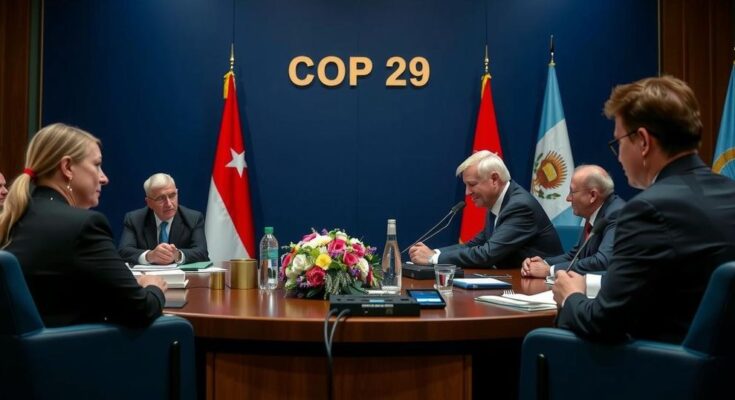Argentina has withdrawn its negotiators from the Cop29 summit after three days, raising concerns about the nation’s commitment to the Paris agreement under President Javier Milei, who has previously denied climate change. The abrupt departure diminishes Argentina’s voice in crucial climate negotiations, leading to fears of broader implications for international cooperation in climate finance and environmental policy.
The Argentine government, under the leadership of President Javier Milei, has ordered its negotiators to withdraw from the Cop29 summit in Baku, Azerbaijan, after only three days of participation. This decision raises alarms regarding the stability of the global climate accord, particularly the Paris agreement, as it may signal a shift towards dismissive attitudes towards climate change in Argentina. Previously, Milei labeled the climate crisis a “socialist lie” and indicated intentions to withdraw from international climate commitments during his election campaign, although he has since retreated from this stance. At Cop29, over 80 representatives from Argentina engaged in discussions on climate finance essential for energy transition, but as of Wednesday, they received directives from the Ministry of Foreign Affairs to cease participation. Ana Lamas, the country’s undersecretary for the environment, confirmed this decision to The Guardian, asserting that it is specific to Cop29 and does not necessarily indicate withdrawal from the Paris agreement. However, concerns linger about Argentina’s commitment to international climate efforts, especially as right-wing leaders abroad, such as Donald Trump, threaten similar actions. Experts have expressed dismay over Argentina’s withdrawal, suggesting it compromises the country’s position in crucial climate negotiations. Carla Chavarria, a climate change management specialist, remarked that the absence from Cop29 reduces Argentina’s leverage in discussions aimed at alleviating the climate crisis, a predicament that may ultimately hinder the nation’s ability to adapt to environmental challenges. Similarly, the Citizens Association for Human Rights called the situation regrettable, citing Argentina’s previous leadership on issues pertaining to gender in climate negotiations. Furthermore, Professor Julieta Zelicovich emphasized that this move significantly jeopardizes trade discussions between the European Union and the Mercosur bloc, indicating that without adhering to environmental standards, expectations for any forthcoming agreements will likely collapse. Oscar Soria of the Common Initiative thinktank described this decision as reflecting a broader ideological shift under Milei’s government that undermines logical diplomacy and exacerbates the economic effects of climate disruption. In summary, Argentina’s sudden withdrawal from the Cop29 summit stands as a troubling indication of its current administration’s stance on climate policy and international cooperation, posing risks not only to national interests but also to global climate initiatives.
The Cop29 summit serves as a vital platform for international negotiations regarding climate change, where nations discuss strategies for financing and implementing energy transitions. Argentina’s participation historically positions it as an influential player in these discussions, particularly in contributing to the global response to climate change through funding and collaborative initiatives. However, the recent shift in leadership towards a far-right agenda under President Javier Milei, who has previously expressed skepticism toward climate science, threatens to destabilize Argentina’s role and commitment to international climate agreements such as the Paris Accord. Milei’s government is characterized by a notable inclination to prioritize economic growth over environmental regulations, raising significant concerns about the future of climate diplomacy in the region.
Argentina’s withdrawal from the Cop29 summit highlights a significant departure from its previous climate policies, reflecting the newly elected Milei administration’s skepticism regarding climate change. This decision not only diminishes Argentina’s voice in critical international negotiations but also casts doubt on its commitment to uphold the Paris agreement. As the global community grapples with the looming climate crisis, such actions by member nations raise alarms about the future of collaborative efforts and the potential resumption of ideologies that undermine climate science and policy.
Original Source: www.theguardian.com




